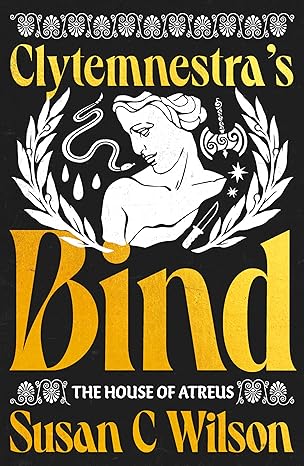Buy on Amazon
Rating: 9/10 Stars
Synopsis
Clytemnestra’s Bind is a bold and brutal first-person retelling that redefines her story, unveiling the untold depths of her soul and the legacy she forged as a mother, wife, and queen.
Queen Clytemnestra's world shatters when Agamemnon, a rival to the throne of Mycenae, storms her palace, destroys her family and claims not only the throne but Clytemnestra herself. Tormented by her loss, she vows to do all she can to protect the children born from her unhappy marriage to him. But when her husband casts his ruthless gaze towards the wealthy citadel of Troy, his ambitions threaten to once more destroy the family Clytemnestra loves.
From one of Greek mythology's most reviled characters—a woman who challenged the absolute power of men—comes this fiery tale of power, family rivalry and a mother's burning love.
Perfect for readers of Greek mythology, and fans of Costanza Casati’s Clytemnestra, Madeline Miller’s Circe, and Jennifer Saint’s Elektra.
Review
I was given a chance to read an early review copy from The Write Reads blogger group, and since I am always a sucker for a good myth retelling, of course I jumped onto it. There have been quite a few mythologic retellings of Greek myths, as well as other pantheons, and it's always interesting to see what authors can dream up. In this case, we get Sarah K. Wilsons idea of what really happened with Clytemnestra, the wife of King Agamemnon, King of Mycenae in ancient Greece, She is the sister of Helen, Queen of Sparta, who is married to Menelaus, Agamemnon's younger brother. If these names sound familiar, it's because Helen has another name: Helen of Troy. This is a tragedy of epic proportions, and shows these characters in ways you would never have expected.
The world building is excellent. We have this picture of Ancient Greece as a land of stately marble edifices, buildings like the Acropolis and the Parthenon. Instead, we see a much more realistic picture, where poverty is endemic and classes are rigidly enforced, and it is very much a land of haves and have nots. It is very much a patriarchal society, in the worst sense of the word. Men are definitely in charge, and it tends to be rule by the strongest, so Kings like Agamemnon tend to be giant bullies, For the women in this society, they have value as baby makers tools to make alliances, and that's about it. It takes an amazing woman to swim against the currents of the society.
The characters are not what I was expecting from the depictions which we get from the mythology. They are so much more complex and realistic. Take Clytemnestra, who is usually seen as a scheming adultress who's lover murdered her husband on his return from the Trojan War. Instead, she is a complex woman who has lived through a lot of tragedy, where her first marriage to the crown Prince of Mycenae is ended when Agamemnon usurps the throne and murders her husband and child, then takes Clytemnestra as his own wife. But instead of the young caring lover she had in her first marriage, she ends up with a callous bully that sees her as nothing but a brood mare who needs to provide him with a male heir or else.
As her life in the palace continues, and she has first one and then another daughter, of whom Agamemnon has no interest, she does her best to provide stability and love to the girls, and protects them as best she can. As things progress, and her sister Helen takes that fateful step to go to Troy, she has to protect all her children, including her new son, as Agamemnon takes advantage of the situation with Helen to grow his own power. But that's where the story changes from what is "known', since Clytemnestra is a savvy daughter of a king herself, and knows that what one person can usurp, another can take as well, and she makes her own plans about how this story will end. If it's one things ancient Greeks understood was revenge, and she is owed more than her share of it, and is determined to get it.
The secondary characters are excellent as well, they get quite a bit of character development, and have unexpected depths. Aegisthus, Clytemnestra's lover in the myths, is Agamemnon's foster brother, a young, popular prince who Agamemnon has bullied for years, seeing in him a potential threat rivals could rally around. He may have feelings for Clytemnestra, but he is a good man who is more interested in seeing her safe and happy in a difficult situation, and does what he can to help protect her, as well as support her. He is not conniving for his brothers throne, but is stuck in a difficult situation.
Helen and Menelaus have an interesting dynamic. Helen is flighty and always looking for more than he has, seeing the grass greener on the other side, while Menelaus, far from the uncaring bully like he's is depicted in movies like Troy, is a doting, loving husband, shy and reserved, who actually cares about Helen and wants to see her happy. Its a dynamic that was bound to fail, because Helen is looking for a bad boy like Paris, not a doting husband like Menelaus, and its not a shock how things turned out.
I really did enjoy this story. It took some interesting twists and turns, and put a new light on an old story. It fits in well with the current trend of retellings like Madeline Miller's Circe, and should have some broad appeal to fans of historical drama and Greek myths. It's not my normal genre, but I'm glad to have gotten a chance to review it, and I may have to check out more historical dramas after this. I recommend checking this book out today.




No comments:
Post a Comment